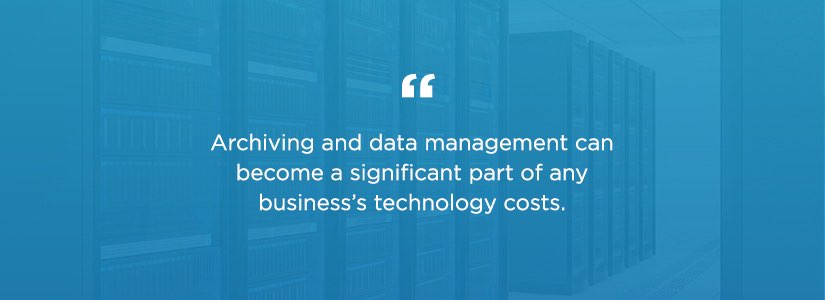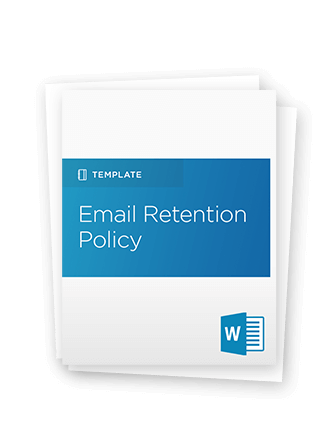Is My Email Server Performance Costing Me Money?

One of the most important elements of managing your email server performance is assessing your email archiving capabilities. If you’re not properly archiving your email communications, your server can become stressed, which can lead to less than optimal performance. This as a result wastes not only your valuable time, but can also cost you money.
The lack of proper equipment can also inhibit your email server performance. Improper archiving hardware and software can create too little space on your email servers, which leads to too much information for your hardware to manage efficiently. In addition, not having a plan for the rapidly changing data landscape, as well as one that does not meet archive and information compliance, can also pose problems. Each of these issues needs to be addressed consistently to make the most of your business’s email service.
Too Little Space
Email communication takes up a large amount of storage space. When you add media attachments to emails, even small businesses quickly generate terabytes of information. The lack of proper storage space causes many issues for a company wanting to maintain archiving compliance or keep records for posterity. These issues include the following:
- No Redundant Systems – When email archiving is done in house, it is difficult to obtain the necessary storage space with cloud level redundancies to prevent catastrophic data loss in the event a server crashes.
- Outdated Hardware – Compare the best servers of 15 years ago with technology today. You will discover that the storage space and processing speed of a $10,000 enterprise server from 15 years ago will be beat by today’s $800 personal computer. Understanding the hardware and software systems to operate your email archives requires up-to-date solutions that many small businesses, local government and schools cannot afford.
- Capital Investment Costs – Many people think that all you need to operate an email archiving system is a server. Besides the risk of losing your information from non-redundant systems, you also increase the likelihood of catastrophic server failures by not storing them properly with the right power supplies and physical and virtual security. This location, where your servers can operate at their best and cheapest, is called a data center. Any adequate email archiving system has to take advantage of a data center and will incur the capital costs of building one.
These are just some of the increased costs (redundant servers, data center capital, updating systems) and risks of building an in-house email archiving system. In order to have the right amount of server space to continuously archive your emails, there are hidden costs many organizations do not take into account.
Too Much Information
Another result of the vast amount of data required for email archiving is the difficulty to find anything. Many businesses and governmental organizations face hours of combing through emails looking for the right piece of information to fulfill the FOIA request or an oversight audit.
Email is quickly replacing snail mail, telephone and even face-to-face conversations in today’s technological work environment. Because so much communication happens over email between your employees, customers and other constituents, searching and organizing this information requires special forms of software, hardware and archiving systems.
Information overload quickly happens in a data rich environment like email archiving. This creates the necessity for building a business system with the right tools to not only manage your server space, but also decrease your labor costs and your email server costs. The following are tools a proper management system for your email information will use:
- Business Intelligence (BI) – BI is the application of large-scale data algorithms to business information. Think Google for your email archives. In order to manage your BI well, you will need to have the right software and algorithms to find the information you are looking for and locate its location on the hard disk.
- EDiscovery Overviews – Anyone with the bad luck of being in a lawsuit involving electronic communication knows the hassle of eDiscovery. The costs associated with finding all the information relevant to the case at hand is astronomical. A good information management system will have already categorized your email archives and give you the tools to find where information and communication is on a higher level than individual email search.
- Intuitive Client Side Controls – Client side controls are what you see when you log into your email archiving solution. In order to efficiently manage your archive you must be able to understand the tools you are using.
These are just three of the various information management issues you need to consider when building an email archiving solution for your business or organization.
Rapid Pace of Data Expansion
Data is expanding in both types and amount throughout the Internet and email communications. Although many data changes in the last decade have not affected email archiving, there are many questions that remain about the integrated communication systems businesses are using to manage their email, video chat, phone conversation and more. Understanding FOIA archive rules, eDiscovery archive requirements, and business record keeping takes special attention to detail for organizations.
Questions regarding archiving systems and technology will need to be constantly addressed by your business, by industry leaders and by your archiving solution designers. These questions include:
- What data needs to be archived? Data includes emails, but can also include chat histories from messaging services. Potential data includes recorded phone conversations, video conferences, and other media rich communication methods.
- What type of data is integrated with our email? Video, 3D images, photographs, audio, the list of possible data types your email service uses goes on. Managing this data is essential to keeping your server capital down, increasing the life of your servers and using as little space as possible with your email solution.
As data creation pushes exponential growth in the amount of data people use every day, your email servers will need to be constantly updated to match them, and your email server and software performance evaluated constantly to ensure maximum profitability, security and access.
Open Source
15 years ago, open source systems were talked about among programming geeks and other people immersed in technology. After Google opened the Internet and then opened smartphone technology with their commitment to open source developments, average people are familiar with the term. Open source software has a large impact on your business’s email servers for many reasons.
Platform
One of the most important things to understand about your servers is the fact that many websites, email exchanges and other enterprise level products are built on the open source platform, Linux. And since customers are demanding access to other platforms’ application program interfaces (API) to create 3rd party software systems, most other server software systems have much of the functionality of an open source system.
When considering the cost of your email servers, there is tremendous opportunity to create custom software solutions to do exactly what your business needs. This is the value of the open source movement: anyone can create powerful applications and integrate them with other business’s software. The one major drawback with creating custom email service and archiving software is the fact that many people try and re-invent the wheel. This adds significant amounts of cost to your email management.
Interface
Many email interfaces are open source as well. Since most open source systems are free to the public, businesses will often opt for open source interface and email server software to manage their email system. The drawback for this type of system is the same as with an open source platform. You can incur large amounts of costs through trying to create something that many other people already have created, tested and improved upon.
In considering open source vs. proprietary software, or even a combination of the two, it is important to find partners who are already there in the email space: it is a multi-billion dollar market, the chances are slim to none of coming up with something not already on the market that will cost you less than the products out there in terms of time invested and capital expenditures.
Compliance Software and Hardware Costs
Archiving and data management to achieve compliance is a significant part of any small organization or business’s technology costs. Maintaining all of your email on your main server is costly in terms of data space and clogging up your hard drive speed.
Good email solutions are integrated across the board with other software systems. This integration gives you the tools to automate archiving, categorization of emails, due diligence and discovery investigation.
As your business grows, your email service needs to grow with it. Data use will increase with your growth as it will increase with time and the growth of electronic mediums of delivering information and communication.
If your email server performance is not consistently evaluated for best-in-industry practices, your email archiving does not use software to reduce the amount of work and space necessary to archive your email, and if your servers are not being regularly updated, they are costing you too much money.
If you are looking at a partner who has experience with email archiving solutions and consistently addresses these issues to reduce the stress on your email servers through best-in industry archiving, consider Intradyn. Intradyn has all of the email archiving solutions to fit your needs and has been a leader in the archiving industry for years. Contact us today to discover how to archive your emails.

